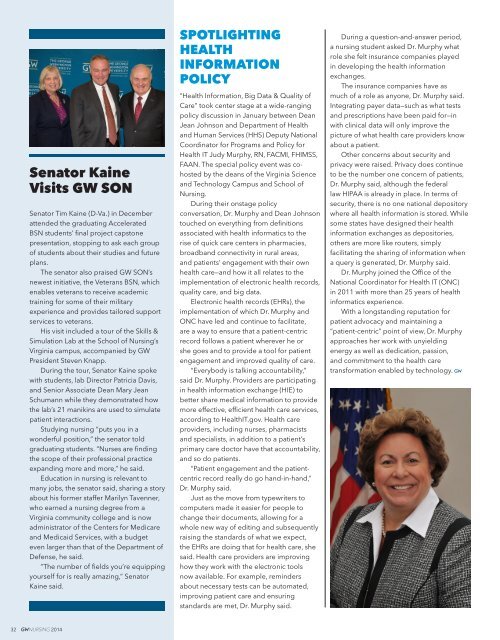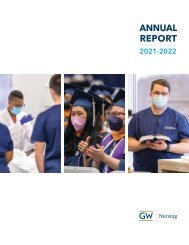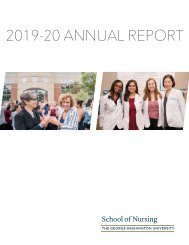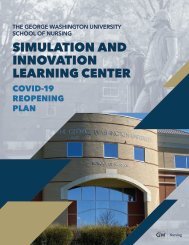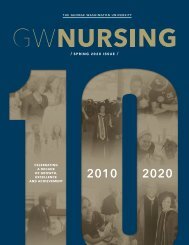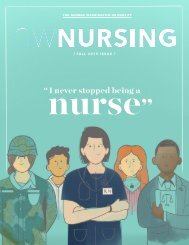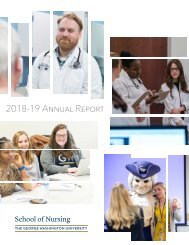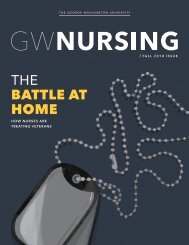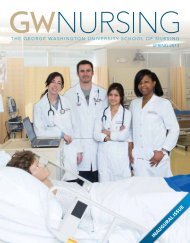GW Nursing Magazine 2014
GW Nursing is a publication of the George Washington University School of Nursing. The magazine tells the story of GW nurses and their endeavors in the areas of education, research, policy and practice.
GW Nursing is a publication of the George Washington University School of Nursing. The magazine tells the story of GW nurses and their endeavors in the areas of education, research, policy and practice.
You also want an ePaper? Increase the reach of your titles
YUMPU automatically turns print PDFs into web optimized ePapers that Google loves.
Senator Kaine<br />
Visits <strong>GW</strong> SON<br />
Senator Tim Kaine (D-Va.) in December<br />
attended the graduating Accelerated<br />
BSN students’ final project capstone<br />
presentation, stopping to ask each group<br />
of students about their studies and future<br />
plans.<br />
The senator also praised <strong>GW</strong> SON’s<br />
newest initiative, the Veterans BSN, which<br />
enables veterans to receive academic<br />
training for some of their military<br />
experience and provides tailored support<br />
services to veterans.<br />
His visit included a tour of the Skills &<br />
Simulation Lab at the School of <strong>Nursing</strong>’s<br />
Virginia campus, accompanied by <strong>GW</strong><br />
President Steven Knapp.<br />
During the tour, Senator Kaine spoke<br />
with students, lab Director Patricia Davis,<br />
and Senior Associate Dean Mary Jean<br />
Schumann while they demonstrated how<br />
the lab’s 21 manikins are used to simulate<br />
patient interactions.<br />
Studying nursing “puts you in a<br />
wonderful position,” the senator told<br />
graduating students. “Nurses are finding<br />
the scope of their professional practice<br />
expanding more and more,” he said.<br />
Education in nursing is relevant to<br />
many jobs, the senator said, sharing a story<br />
about his former staffer Marilyn Tavenner,<br />
who earned a nursing degree from a<br />
Virginia community college and is now<br />
administrator of the Centers for Medicare<br />
and Medicaid Services, with a budget<br />
even larger than that of the Department of<br />
Defense, he said.<br />
“The number of fields you’re equipping<br />
yourself for is really amazing,” Senator<br />
Kaine said.<br />
SPOTLIGHTING<br />
HEALTH<br />
INFORMATION<br />
POLICY<br />
“Health Information, Big Data & Quality of<br />
Care” took center stage at a wide-ranging<br />
policy discussion in January between Dean<br />
Jean Johnson and Department of Health<br />
and Human Services (HHS) Deputy National<br />
Coordinator for Programs and Policy for<br />
Health IT Judy Murphy, RN, FACMI, FHIMSS,<br />
FAAN. The special policy event was cohosted<br />
by the deans of the Virginia Science<br />
and Technology Campus and School of<br />
<strong>Nursing</strong>.<br />
During their onstage policy<br />
conversation, Dr. Murphy and Dean Johnson<br />
touched on everything from definitions<br />
associated with health informatics to the<br />
rise of quick care centers in pharmacies,<br />
broadband connectivity in rural areas,<br />
and patients’ engagement with their own<br />
health care—and how it all relates to the<br />
implementation of electronic health records,<br />
quality care, and big data.<br />
Electronic health records (EHRs), the<br />
implementation of which Dr. Murphy and<br />
ONC have led and continue to facilitate,<br />
are a way to ensure that a patient-centric<br />
record follows a patient wherever he or<br />
she goes and to provide a tool for patient<br />
engagement and improved quality of care.<br />
“Everybody is talking accountability,”<br />
said Dr. Murphy. Providers are participating<br />
in health information exchange (HIE) to<br />
better share medical information to provide<br />
more effective, efficient health care services,<br />
according to HealthIT.gov. Health care<br />
providers, including nurses, pharmacists<br />
and specialists, in addition to a patient’s<br />
primary care doctor have that accountability,<br />
and so do patients.<br />
“Patient engagement and the patientcentric<br />
record really do go hand-in-hand,”<br />
Dr. Murphy said.<br />
Just as the move from typewriters to<br />
computers made it easier for people to<br />
change their documents, allowing for a<br />
whole new way of editing and subsequently<br />
raising the standards of what we expect,<br />
the EHRs are doing that for health care, she<br />
said. Health care providers are improving<br />
how they work with the electronic tools<br />
now available. For example, reminders<br />
about necessary tests can be automated,<br />
improving patient care and ensuring<br />
standards are met, Dr. Murphy said.<br />
During a question-and-answer period,<br />
a nursing student asked Dr. Murphy what<br />
role she felt insurance companies played<br />
in developing the health information<br />
exchanges.<br />
The insurance companies have as<br />
much of a role as anyone, Dr. Murphy said.<br />
Integrating payer data—such as what tests<br />
and prescriptions have been paid for—in<br />
with clinical data will only improve the<br />
picture of what health care providers know<br />
about a patient.<br />
Other concerns about security and<br />
privacy were raised. Privacy does continue<br />
to be the number one concern of patients,<br />
Dr. Murphy said, although the federal<br />
law HIPAA is already in place. In terms of<br />
security, there is no one national depository<br />
where all health information is stored. While<br />
some states have designed their health<br />
information exchanges as depositories,<br />
others are more like routers, simply<br />
facilitating the sharing of information when<br />
a query is generated, Dr. Murphy said.<br />
Dr. Murphy joined the Office of the<br />
National Coordinator for Health IT (ONC)<br />
in 2011 with more than 25 years of health<br />
informatics experience.<br />
With a longstanding reputation for<br />
patient advocacy and maintaining a<br />
“patient-centric” point of view, Dr. Murphy<br />
approaches her work with unyielding<br />
energy as well as dedication, passion,<br />
and commitment to the health care<br />
transformation enabled by technology.<br />
32 <strong>2014</strong>


